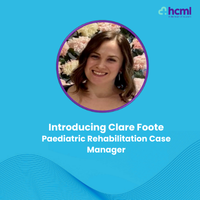
I qualified as a Children’s Nurse in 2016 and began my career at the Royal Manchester Children’s Hospital, working on a neurology, neurosurgery, spinal, ENT, and orthopaedic unit. During my first year, I cared for multiple patients injured in the Manchester Bombing, which sparked my interest in trauma and rehabilitation. I was also involved in a research study exploring the impact of the bombing on healthcare and emergency service workers.
I later relocated to Surrey and joined The Children’s Trust as a school nurse for children with profound and multiple learning disabilities (PMLD). During the Covid-19 pandemic, I was seconded to a neurorehabilitation, step-down, long-stay, and residential school unit with a focus on complex respiratory management. After returning to my school nurse role, I continued to develop my expertise in caring for children with highly complex medical, educational, and therapy needs.
I then became House Manager of the neurorehabilitation unit, leading a team of 30–65 nurses and carers delivering 24/7 care across rehabilitation, long-stay, step-down, respite, and residential school services. My focus was supporting children, young people, and families from admission and assessment through to complex discharges back into the community.
Following this, I worked with a care agency supporting children with complex needs at home before taking on my current role as a Paediatric Rehabilitation Case Manager at HCML!
Why the change from nursing to case management?
I was looking for a role where I could apply my clinical and rehabilitation experience to help families navigate complex healthcare pathways while achieving a better work-life balance and the flexibility of working from home. Case management offered the perfect opportunity to continue making a difference while broadening my professional scope.
How did you come to specialise in paediatric rehabilitation?
My passion for paediatric rehabilitation grew while managing a residential neurorehabilitation unit. Supporting children and families through their recovery journeys and seeing the real impact of rehabilitation on their lives was incredibly rewarding, and it became the area I wanted to specialise in.
What approaches do you have to take when it comes to supporting parents and managing their expectations? How do you build relationships and what’s important when it comes to building relationships?
Supporting families through the complexities of paediatric rehabilitation requires clear communication, empathy, and transparency. I prioritise setting realistic expectations early, providing regular updates, and involving families in every step of their child’s care.
I believe strong relationships are built on trust and understanding. I make a point of being approachable, listening actively, and respecting each family’s unique experiences. Creating a safe space for parents and children to share their feelings and feedback fosters collaboration and ensures that care plans truly reflect their needs.
Is there a particular case throughout your career that has really made an impact on you and why?
I supported a young person and their family through a prolonged admission marked by multiple barriers to discharge and limited statutory support. Over five years, I advocated for the family, ensuring the young person remained at the centre of all decisions. Working with this young person and their family taught me a lot about living life to the fullest and being grateful for everything that we have.
Can you give an example of how you’ve supported a child to achieve a specific goal?
While managing the neurorehabilitation unit, I helped a mother plan her three-year-old daughter’s first outing after a long hospital stay—a surprise dinner for her father’s birthday. I coordinated transport, adjusted staff schedules, and ensured the whole team kept the surprise secret. This milestone meant a great deal to the family, marking a joyful step toward reintegration into their community.
Can you tell me about some of the innovative solutions you’ve put in place to ensure excellent care?
When I became manager of the neurorehabilitation unit, compliance levels were very low. I developed a structured improvement plan with weekly reviews, resulting in consistent 100% compliance across all areas for more than two years. This ensured the team remained fully trained and equipped to deliver safe, evidence-based, and high-quality care at all times.
Tell us something interesting about yourself.
I love to travel! Earlier this year, my partner and I spent a month exploring Panama, Costa Rica, and Mexico, including a memorable stay on a catamaran where we got engaged. Next on the list are New York and at least one ski trip this winter! I also have a nearly 11 year old teacup Yorkshire Terrier who is my absolute world. Being away from him is my only downside to travelling! However, working for HCML means I get a lot more time at home with him.
What attracted you to HCML?
I was drawn to HCML after speaking with Katherine, one of the Operations Managers. Her openness, kindness, and enthusiasm for the company left a lasting impression on me, and I knew I wanted to be part of such a supportive team. I’m grateful for the opportunity and delighted to have joined HCML.











